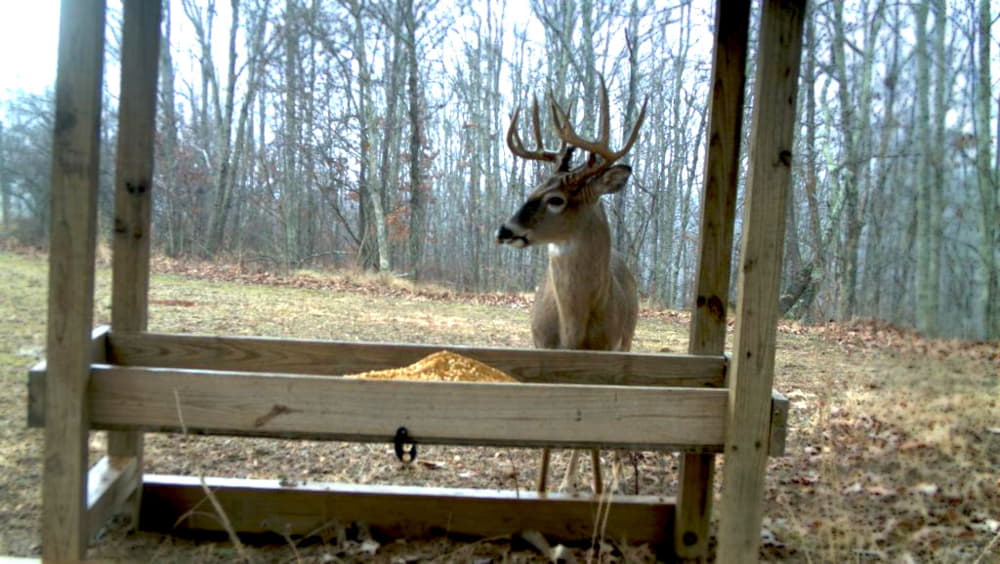Deer are majestic creatures that can be fascinating for many people to observe. It’s not uncommon for homeowners to want to feed them, especially during the winter months when food is scarce. However, is it illegal to feed deer on your property?
There are significant concerns regarding the ecological and legal repercussions of feeding deer on private property. Although the intentions behind feeding deer may be good, the practice can have negative effects on the environment and society.
Different jurisdictions have different rules and laws surrounding feeding deer. The rules primarily focus on factors like disease transmission, habitat disruption, and population control. It is essential for property owners to comprehend local regulations and natural dynamics in order to make wise decisions about feeding deer.
In this article, we will explore the legality of feeding deer on your property and provide insights into why it may or may not be a good idea.
Why Do People Enjoy Feeding Deer?
Homeowners frequently like to give food for deer to consume. They may desire to do this for a variety of reasons, including:
Watching Deer
Homeowners may get a chance to view deer up close and personal by feeding them. Deer watching can be a wonderful opportunity to get in touch with nature and enjoy wildlife’s beauty. In addition, interacting with and watching deer may be therapeutic, allowing you to unwind and decompress in the middle of nature.
Helping Deer During Winter Months
During the winter months, food can be scarce for deer, making it challenging for them to survive. Feeding deer during the winter can help supplement their diets and provide them with the necessary nutrition to make it through the winter.
Some people think that by giving deer more food, they are helping them. Especially when there may not be enough natural food sources due to bad weather.
Controlling Deer Damage
In some instances, giving deer food can help stop them from harming gardens or crops. When deer are starving, they may turn to consuming plants that are not typically a part of their diet, which can cause harm to nearby property.
Compassion And Empathy
A sense of empathy and compassion for wildlife can drive people to want to help and care for animals they perceive as vulnerable. As neighbors and guests may congregate to see and interact with the animals, feeding deer helps foster a sense of community.
Is It Illegal To Feed Deer On Your Property?
The laws in your area and where you live will determine whether feeding deer on your property is permitted or not.
Laws Vary By State And Local Jurisdictions
In many regions, laws and regulations exist to govern wildlife management and conservation efforts. Some regions outright forbid feeding deer, while others have precise laws dictating what and how much you can give them.
These rules are made to protect the ecosystem as a whole as well as the deer population. The spread of diseases is one of the main issues.
Before feeding any wildlife, it’s essential to research your state’s laws and regulations concerning feeding deer. Understanding the potential legal ramifications and ecological factors can be gained by speaking with local wildlife agencies or specialists. These organizations are able to give you precise and current information on local laws.

You’ll be better able to weigh your objectives against the wider impact on wildlife and the ecosystem and come to a wise decision.
Consequences Of Breaking The Law
You may be subject to harsh legal repercussions, such as fines, jail time, or both, if you feed deer in violation of the law. These consequences can vary based on the specific laws and regulations in your jurisdiction.The purpose of these sanctions is to discourage unrestricted deer feeding and encourage ethical conduct.
For instance, it’s against the law to feed deer on private property in Michigan; offenders might spend up to 90 days in jail and pay a $500 fine. Feeding deer is prohibited in Ohio as well, and offenders are subject to a $100 automatic fine plus court costs.
Read this post: What to Feed Deer Other Than Corn: Healthy Food For Deer!
Reasons Why You Shouldn’t Feed Deer
While feeding deer can seem like a harmless act of kindness, it can have negative consequences for both the animals and people.
Health Risks
Deer feeding poses significant health dangers to the animals. Food waste may draw rats, which may then spread diseases that are harmful to deer and other wildlife. Additionally, artificially feeding deer can concentrate them, which can help diseases like Chronic Wasting Disease (CWD) spread among animals.
In short, feeding deer food outside their natural diet can lead to health problems and malnourishment.
Habitat Disruption
Another crucial factor is disrupting habitat. Deer can alter their natural behavior when fed regularly. They might change their travel patterns and foraging behaviors as a result of becoming increasingly dependent on human-provided food sources. This disruption can affect plant life and other animals dependent on the same habitat, leading to imbalances in the ecosystem.
Dependence On Human Food
Deer that rely on human-provided food can lose their ability to forage naturally. This dependence can make them less resilient in the face of changing food availability and can harm their overall health.
Deer Overpopulation
Deer overpopulation, which can have disastrous repercussions on the ecosystem, can also result from feeding deer. Crops, gardens, and other natural ecosystems may sustain damage as deer numbers rise. Deer-vehicle collisions, which can be hazardous for both people and animals, may rise as a result of overcrowding.
Habituation
By being fed by us, deer may develop a tolerance for people and lose their inherent dread of us. This may make them more aggressive or reliant on people for food, both of which have more harmful effects.
Conclusion
Is it illegal to feed deer on your property? The answer depends on where you live and the potential consequences of feeding deer. While feeding deer can seem like an act of kindness, it can have serious negative consequences for both the animals and people. It’s important to review the rules and restrictions in your state before determining whether or not to feed deer. You should also think about any potential effects on the environment and neighborhood.

